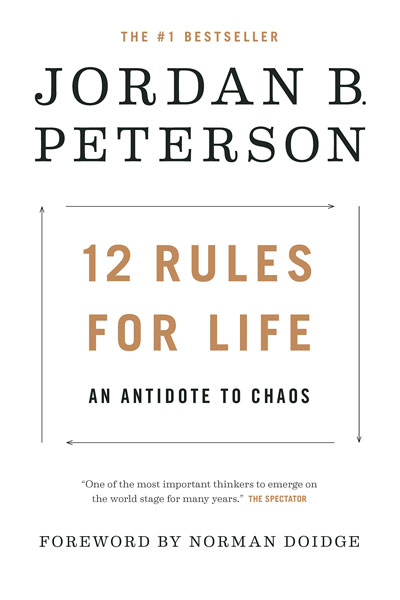

This article is an excerpt from the Shortform summary of "12 Rules for Life" by Jordan Peterson. Shortform has the world's best summaries of books you should be reading.
Like this article? Sign up for a free trial here .
In 12 Rules for Life, Rule #10 is “Be Precise In Your Speech.” What does this mean?
In summary, Jordan Peterson’s Rule 10 instructs you to define problems exactly. Don’t just leave a problem as a vague, diffuse issue. This will keep you irritated and anxious. Instead, put your problem into specific words. Give form to your problem – only then will you be able to deal with it.
Below, we’ll cover in much more detail Rule 10 in Jordan Peterson’s 12 Rules for Life.
Overview of Jordan Peterson’s Rule 10
When you have a problem, there is often the temptation to paper it over, to think the problem will go away by itself. It’s easier to keep the peace and avoid the anxiety, despair, and sadness that will come with confronting your problems. It’s easier to pretend the problem doesn’t exist than to admit it does and the pain that accompanies it.
Maybe you hate going to work every day. Maybe you can’t stand the way your partner chews. Maybe you stare blankly at the ceiling each morning, unable to drag yourself out of bed. Maybe you feel a simmering level of rage throughout the day. You don’t know exactly what it is, but it’s more pleasant not to think too hard about it and try to get through another day.
Left unaddressed, this will gradually build until it leads to a catastrophic failure. You will regret not having acted sooner.
Specificity turns chaos into a thing that you can deal with. If you have a vague unease, you will struggle with it until you define it explicitly and give it a concrete form. According to Jordan Peterson’s Rule 10, once you precisely identify the issue, you will likely realize that you were far more afraid than you should have been, and you now have a specific target to confront. “Be precise in your speech.”
If you have cancer somewhere in your body, wouldn’t you want to know where and what it is as soon as possible, so you can do something about it? Why don’t you treat every other problem in your life with the same urgency and clarity?
Give structure to the chaos through specific speech. If you speak carefully and precisely, you can make order from the chaos, develop a new goal, and navigate to it.
Precision sorts out the uniquely terrible thing from all the other, equally terrible things that did not happen. If you have pain in your abdomen, you start with a vague set of terrifying possibilities. Then you go to the doctor, who collapses the possibilities into a single, clear diagnosis. You feel less anxiety, certain now that it’s addressable, and you laugh at your previous anxiety. Why are your other concerns and problems any different?
You cannot move in life without aiming in a direction. Random wandering will not move you forward. According to Jordan Peterson’s Rule 10, it will make you disappointed and frustrated and resentful.
Be precise in your speech. What is the problem, exactly? What do you want, exactly? Why, exactly?
Endure the sharp pain of specificity and confrontation instead of the chronic vague dull ache of negligence. Once you identify it, things will get better.
Interpersonal Conflicts and Precise Speech
Many issues of this sort have to do with interpersonal relations, particularly with your romantic partner. Communicating what you really think risks immediate negative emotions – resentment, jealousy, frustration, hatred. So it’s easy just to pretend you’re a saint, try to move on, that “it’s not worth fighting about.”
In a marriage, there is little that is not worth fighting about. Do you really want an annoyance tormenting you every day of your marriage, for the decades? All it takes to invite disaster is to do nothing.
The longer you wait, the more the little problems form a thick interrelated cobweb. Each small unresolved resentment piles onto the next one, aggregating into a ball of hate. According to 12 Rules for Life, sometimes the person you resent is totally unaware that you’re resentful. You behave poorly, which makes the other person react poorly, thus perpetuating a vicious cycle. Each argument becomes difficult to extricate from all the other problems – hence the stereotypical couple’s argument digging up grievances from years past.
Instead, specify exactly what is bothering you. Share this with the person. It’s far better to do this earlier than later. If you let everyday resentment gather, it may eventually bubble up and destroy everyone.
Focus the argument only on the specific thing that is bothering you. Both people should promise just to solve just that one issue – the other problems will have their due time, so don’t unearth them or get distracted.
One by one, you reveal and solve each issue. You clear the cobweb that was once impenetrable.
(Shortform suggestion: As you discuss, keep asking why. You can’t clean out a dental cavity without digging out all the rot from the very bottom. Maybe she finds his laugh annoying (why?), because she doesn’t want him to be happy when she isn’t (why?), because she thinks he held her back from her ambition when they agreed to focus on his career, but she now regrets it (why?), because she saw how it ate at her mother and ruined her parents’ marriage, and now she feels guilty about not being stronger as a person.
Now she sees it’s not really about his laugh, but about far deeper issues. These issues are hard to fix and take time – but it’s far better to know what the issue is, than to ignore it and try to pretend it doesn’t exist.)
The World in Abstraction
According to 12 Rules for Life, we have a tendency not to dig into things because it makes our lives easier. Day to day we perceive the world with vast simplifications, happily unaware of the complexities underlying the surface. We perceive only what is enough for our plans to work and for us to get by.
When everything works according to plan, we don’t need to peer under the surface. We drive a car, indifferent to how an engine transmits power to the wheels, the labor that produced the car, the electricity that powers the street lamps. We just care that the car functions to get us from point A to point B. We abstract away the world to simplify our lives because there is too much complexity to understand in ways that aren’t immediately useful.
When the world doesn’t work properly, you have to peer into this complexity. This is chaos. According to 12 Rules for Life, chaos provokes anxiety. When your car breaks, you have to figure out what’s wrong, find a mechanic who can fix it, think about how to just a mechanic, and figure out how much the unexpected cost will eat into your financial plans. You may plunge further into chaos: are drivers more dangerous now? Am I incompetent as a driver? When the simplified world breaks down, the complex world that was hidden away becomes obvious.
This happens with relationships too. In a stable romantic relationship, both people have their roles and identities, their history, and their conception of the future. If one partner cheats on the other, all is shattered. How could this possibly have happened? Who is this person I’m living with? How could she have done this? What part of the happy past needs to be rewritten?
Precision of aim and careful attention protects us when things break down. This is how you can live the creed, “Be precise in your speech.”
———End of Preview———

Like what you just read? Read the rest of the world's best summary of "12 Rules for Life" at Shortform . Learn the book's critical concepts in 20 minutes or less .
Here's what you'll find in our full 12 Rules for Life summary :
- Why standing up straight will make people treat you differently
- How to find meaning in your life and work
- Why you're lying to yourself without realizing it






